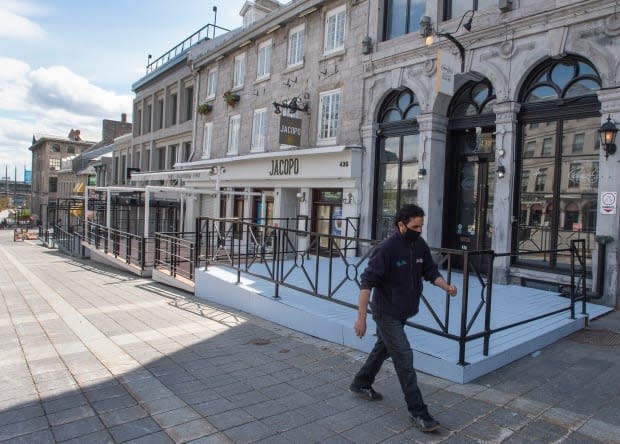Roll out vaccine passport in time for summer, Quebec business group says

A major business lobby group is urging the Quebec government to "rapidly" implement a vaccine passport system to regulate who can get into restaurants, stores and events.
The federation of Quebec chambers of commerce said in a statement Tuesday that restricting some businesses to clients and staff who have been vaccinated would allow them to reopen earlier.
"Proof of vaccination would make it easier to reopen restaurant dining rooms and hold events that would greatly help the tourism sector with summertime approaching," said the statement by the the federation, which represents around 50,000 businesses in Quebec.
It is also pitching the passport system as a way to revive downtown cores around the province by allowing workers to head back to the office and fans to attend sporting events.
"We've already lost the Montreal Grand Prix this year, and such an event could have been possible if a requirement for proof of vaccination was in place. We're hopeful that we'll be able to attend Montreal Canadiens playoff games," said Charles Milliard, the federation's president and executive director.
With the QR code that Quebec will begin distributing Thursday to people receiving the vaccine, Milliard said the technology is now in place to set up a passport system quickly.

Health Minister Christian Dubé explained that the QR code — a scannable image that contains information — will be offered as a digital alternative to the paper proof of vaccination that is currently handed out.
The government will not, for the moment, make publicly available the algorithm needed to unlock the coded information, Dubé said.
That means businesses, or other non-governmental entities, won't be able to use the QR code to impose their own access restrictions.
"There is no application for this right now, at all," Dubé said Tuesday at a news conference in Quebec City.
But Quebec's public health department is studying the possibility of setting up a passport system along the lines suggested by the federation. A decision isn't expected for several weeks, Dubé said.
"In the meantime, people will have their QR codes and they will be, at one point, able to use it for something, but, at this stage, nothing has been decided," he added.
Popular support, but political reticence
The federal government has indicated it will develop a vaccine passport to allow Canadians to travel internationally to countries with public health entry requirements.
Using a vaccine passport domestically poses thornier ethical issues, given inequalities in vaccine coverage based on income, geography or race. But the concept does appear to enjoy support within the Quebec government and the public at large.
Quebec's economy minister, Pierre Fitzgibbon, said in a recent interview that he backed the passport idea as a way to speed up the recovery of businesses hit hard by restrictions.

A poll released Tuesday by the public opinion firm Leger suggested 61 per cent of Canadians supported the concept of a domestic vaccine passport system. Among Quebecers, support was 69 per cent, though the sample size in the province was only 359 respondents.
Opposition parties are more reticent. The Parti Québécois leader, Paul St-Pierre Plamondon, said a domestic passport system would create "a dangerous precedent" for access to health data.
His hope is that sufficient numbers of Quebecers get vaccinated in short order, making the passport system unnecessary.
"Before we rush into having a vaccine passport, we should, first of all, succeed with the operation of getting our population vaccinated and see the proportion we get," Plamondon said Tuesday.
Québec Solidaire has been calling on the government to hold legislative hearings on the issue, in order to better understand the potential disadvantages. On Tuesday, Liberal Leader Dominique Anglade said the passport raised "ethical questions."

